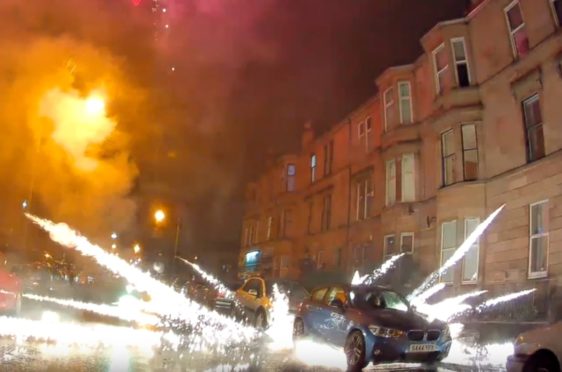
Leading burns specialists fear that the ban on public firework displays will increase the toll of burns victims admitted to hospitals from back garden displays.
Their warning comes as research shows there were nine times as many injuries in homes and gardens last year as at large public firework displays. Experts fear that figure will climb this year.
David McGill, a consultant plastic surgeon in Glasgow, said: “I have already treated a patient with serious hand injuries three weeks before Guy Fawkes Night.
“It is our fear that there will be more firework burns this year because of the ban on public displays as people create their own back-garden displays. Some of the injuries to adults are life-changing with people losing their sight, fingers and burns-damaged hands, lasting scars which are all distressing, disabling and painful.”
Mr McGill, who is a senior plastic surgeon at Scotland’s biggest burns unit, the Canniesburn plastic surgery unit at Glasgow Royal Infirmary, and also the Scottish Burns Network Clinical lead, added: “We appreciate the need not to have gatherings of people during Covid but we also warn people not to attempt their own displays.
“I am told some shops have sold out of their fireworks weeks before November 5. The right thing to do would be to ban sales to the public.”
Eleanor Robertson, a plastic surgery registrar at NHS Greater Glasgow and Clyde, is co-author of a new report into firework injuries, called Evaluation of Firework-Related Harm in Scotland.
The study found that between October 15 and November 12 last year, there were 19 injuries at firework displays in gardens, but only two at large organised events.
Of the 41 people seen in hospital, 23 were children aged 16 or under.
Mrs Robertson said: “The evidence points strongly to people being more likely to be injured at home displays and with public ones being banned, we worry that more people will have back garden ones of their own.
“The usual messaging is to attend public events but that can’t happen this year. It is my fear that firework injuries will increase this year with home displays.”
The study also found that in the 12 years to 2019, treatment to firework injuries ranged from wound cleansing to highly complex skin grafts, and two cases where surgeons had to remove a patient’s eye. Over the same period, 104 patients required admission to hospital, with more than half from the Greater Glasgow and Clyde Health Board area. This rate of admission was 10 times higher the admission rate of a regional burns centre in England.
Retailers urged to stop selling fireworks by Scottish vets fearing rise in private displays
Potential risks of public display bans due to Covid-19 restrictions were highlighted at the Scottish Government’s Firework Review Group in August. Fears have been expressed of increases in online sales of legal and more powerful illegal fireworks.
Fraser Stevenson, vice-chairman of the British Fireworks Association and director of Glasgow-based fireworks retailer AF Pyro Limited, said: “Sales have increased but we will not know the true picture until nearer bonfire night as people tend to buy two to three days before.
“Fireworks sold in the UK are strictly regulated but more powerful ones are bought online from Poland and alarmingly flown in on planes.”
He told the recent Firework Review Group meeting that 334 people are employed in the fireworks industry. It adds £2,634,584 to the economy annually, not including profits.
Last October the Scottish Government published its Firework Action Plan, to promote the safe use of fireworks in Scotland, after the majority of respondents to a public consultation backed a ban on sales. However, the Scottish Government is unable to change the law on sales as this is reserved to Westminster.

Enjoy the convenience of having The Sunday Post delivered as a digital ePaper straight to your smartphone, tablet or computer.
Subscribe for only £5.49 a month and enjoy all the benefits of the printed paper as a digital replica.
Subscribe